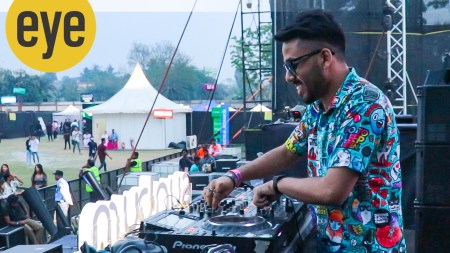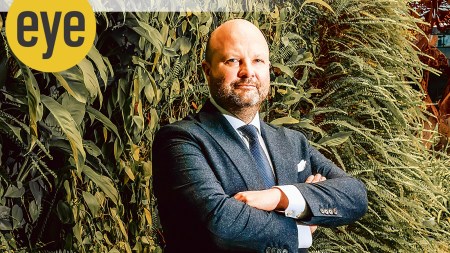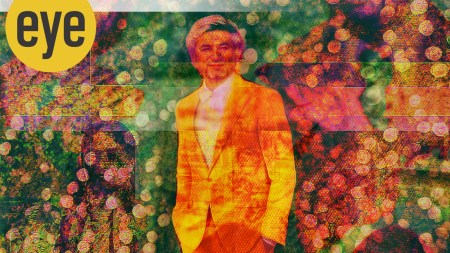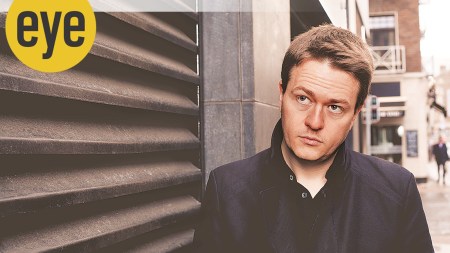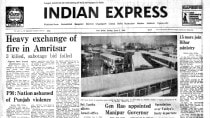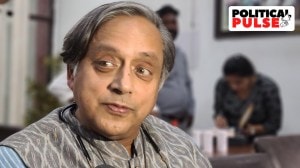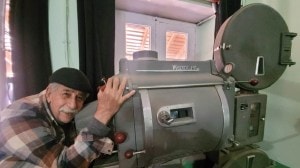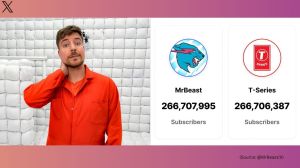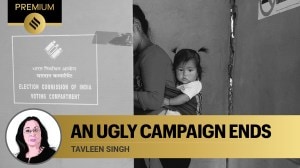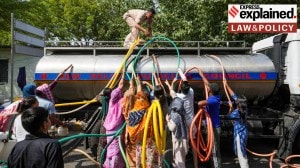- India
- International
Tavleen Singh writes: Voters are not mendicants with begging bowls, elected representatives not rulers
BJP's welfare schemes have created what Amit Shah described in an interview last week a voting block of ‘crores of beneficiaries’.
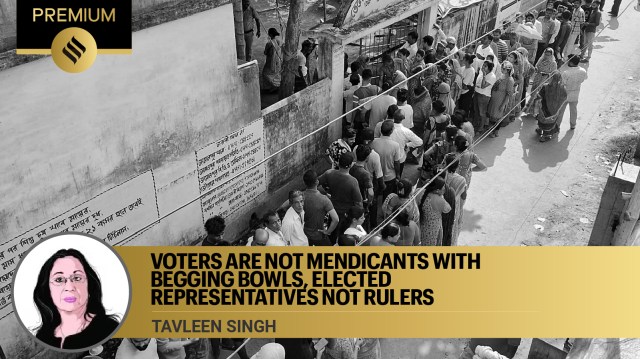 People queue-up outside polling booths in West Bengal to cast their votes during the ongoing Lok Sabha elections. (Express Photo: Partha Paul)
People queue-up outside polling booths in West Bengal to cast their votes during the ongoing Lok Sabha elections. (Express Photo: Partha Paul)The Prime Minister chose to make a mockery of Rahul Gandhi’s usage of the expression ‘khatakhat, khatakhat (fast, fast)’ to describe how rapidly money would be distributed to the poor if the Congress wins this election. I wish he had listened a little more seriously. Personally, I found Rahul’s speech scary because it revived memories of a time when Indian voters believed that the government was their only benefactor. It was a time when voters thought of themselves as humble supplicants whose only role was to pay obeisance to their political leaders in the hope that this would bring some benefits their way.
In the ‘khatakhat, khatakhat’ speech, Rahul promised to give every woman in every poor family in the country a monthly cheque of Rs 8,500. “Modi gives money to his rich friends,” he said, “but I will give money to you. Khatakhat, khatakhat.” He implied that the money up for distribution belonged to him and not to taxpayers. Days later, the Congress President declared that the BJP was only giving 84 crore Indians five kilos of free rations a month but if the Congress formed the next government, this would be doubled to ten kilos of free rations. In this race to show how much poverty and the poor are revered, the BJP is very much in competition with the Congress. The only difference is that when Modi makes his ‘guarantees’, he also mentions what he has already done.
His welfare schemes have created what Amit Shah described in an interview last week a voting block of ‘crores of beneficiaries’. These are those people who have got not just free rations every month in the past decade, but also subsidised toilets, gas cylinders, homes and health insurance. These welfare schemes have helped reduce poverty in rural India. The problem in these last weeks of the election campaign is that the fine line between real welfare schemes and unproductive largesse has become so blurred that it is hard to distinguish between the two.
There is a vital difference. Real welfare schemes empower people living in extreme poverty. Large handouts of cash usually turn very poor people into eternal mendicants. As someone who remembers those days when it was a common sight to see long lines of supplicants form outside the homes of political leaders, it worries me when voters who have only just learned to become more aspirational are now being persuaded to become supplicants once more.
In those supposedly glorious socialist decades, when voters were supplicants and high officials thought of themselves as rulers, rich businessmen were humiliated as much as the very poor. Nobody enjoyed this more than the mighty mandarins who controlled the levers of the Government of India. They sat in their vast offices with smug expressions on their faces as petitioners lined up before them. I remember one of them telling me with a proud smile on his face, “I may not have made much money in my life as a bureaucrat, but I have seen the richest men in India come before me on their knees.”

His words sickened me then. And it sickens me today, when I hear our political leaders speak in grandiose terms of how much they are going to ‘do for the poor’ if they get elected. Naturally, they do not dare admit that the money for their ‘povertarian’ schemes will have to be taken out of budgets for infrastructure, schools and hospitals. If ‘the poor’ knew this, they might suggest that instead of freebies being thrown into their begging bowls they would prefer it if the school in their village was improved and if the project to bring drinking water into their homes was built faster. This is not a choice that political leaders have offered during this election campaign because for now all they want are votes. Talk to any politician these days and he will tell you that voters are not impressed with real welfare schemes. It is populism that works.
It has saddened me to see that the Prime Minister has plunged the murky depths of populism in his campaign speeches. He did not need to. He continues to be in pole position. So, it cheered me up to hear him say truthfully in an interview to India Today last week that those who talked of how unequal India had become in the past decade seemed to prefer that everyone live forever in poverty. “When prosperity comes,” he said, “inevitably some people rise quicker than others and inequality increases.” When asked about the charge Rahul Gandhi has repeatedly made that Modi’s best friends are Ambani and Adani, he said that we should be proud of those who create wealth.
Yes, we should. And we should be ashamed of politicians who are trying to turn rich against poor and upper caste against lower caste. These divisions exist today but those who remember that era of socialism as well as I do know that these divisions have sadly always existed. If anything, they have faded a little with the prosperity that India has seen only since the license raj ended.
What we have not shaken off is the habit of turning voters into mendicants with a begging bowl always in their hands. What we have not shaken off is that very bad habit of allowing our elected representatives to think of themselves as rulers instead of as servants of the people.
EXPRESS OPINION
More Explained
Jun 02: Latest News
- 01
- 02
- 03
- 04
- 05





